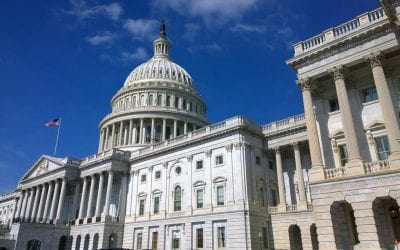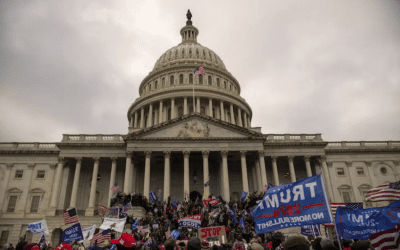Democracy Corps’ new “Republican Party Project” survey of the GOP’s potential coalition exposes the very new dynamics created by Donald Trump and the 2016 election. Pay close attention because there are risks and opportunities all around.[1]
This group of Republican base voters and Trump voters was forged by their disdain for Hillary Clinton, desire to repeal and replace Obamacare, more socially conservative views, and belief that Donald Trump has good plans to grow the economy and create jobs. But this coalition is full of potential fractures. First, 10 percent of Republicans did not vote for him against Clinton. This group is comprised heavily of moderates and college graduates who are more pro-trade – and probably aren’t being won back. Second, there is group of independents and Democrats of comparable size who voted for Trump in the end, but who share few of his values and priorities.
It is a real possibility that Donald Trump’s visible battle with American companies on behalf of American workers will shake things up and get him an audience beyond the 46 percent who voted for him in November’s election. We will know pretty soon.
In the meantime, Trump is pursuing a strategy that may re-enforce the disdain of moderates and college graduates who dominate the group that did not vote for him. He has doubled down on energizing the Republican Trump voters—and they like what they see. Will they be mobilized to defend him or will they become disillusioned on some issue? And the non-Republican Trump voters, you shall see, are a profoundly different lot with a different world view and real potential to pull back, especially from Republicans in the mid-terms.
Fake news will be a real part of the equation impacting how these voters react to events. Republican base voters dislike the elite press and Trump voters of all stripes believe facts rooted in fake news and promoted by Trump. They believe that Trump won in an Electoral College landslide and that millions of illegal immigrants gave Hillary her national popular vote majority. GOP defectors and moderates are the most skeptical of Trump’s facts.
This one-of-a-kind Republican Party Project survey examined the potential coalition of Republican base voters (those who identify as Republican or vote in Republican primaries) and those who voted for Donald Trump.

The President-elect alienated 14 percent of this coalition with his divisive campaign, unique brand of economic nationalism, and apparent self-dealing. The GOP defectors are deeply worried that Donald Trump will be too authoritarian and use his office to provide a platform for extreme social ideas and to enrich himself. They are the most concerned by reports that Trump is appointing the swamp instead of draining it and that he conducting business with foreign countries while president-elect. These voters broke with Trump, but Republicans in Congress will find themselves challenged if they don’t bring them back into the fold in 2018.
Donald Trump was elected in spite of these defectors by bringing over at the end an equal number of voters who are independents or Democrats. When you see their priorities, it is clear why they voted against Clinton and for Trump. They might stay in this coalition if Trump delivers on his promises on American jobs. But they also favor government health care, want entitlements protected and aid for the vulnerable, are pro-union and are very suspicious of CEOs and Wall Street and will be watching how Trump works with Republicans in Congress carefully.
It cannot be emphasized enough how different the non-GOP Trump voter is at the core. They are working people and on the edge financially. The great majority of GOP base and Trump voters identify as middle class, but a 54 percent majority of these non-GOP Trump voters say they are working class. Half say they could not handle an unexpected $500 expense, compared to just a quarter of Republican base voters. They are desperate for economic relief and turned to Donald Trump because he railed against the corporate elite and promised to end out-sourcing and restore American manufacturing, invest in infrastructure, cut taxes for the middle class and not touch entitlements.
Non-GOP Trump voters are fish out of water in this new potential Republican coalition. They do not trust the Republican Party (only 31 percent have favorable views) and do not subscribe to the conservative orthodoxy on:
- Unions (57 percent have favorable views of unions),
- Regulations (63 percent say a free market needs regulation to serve the public interest),
- Taxes (79 percent say people making over $250,000 should pay a lot more in taxes), and
- The safety net (59 percent say it’s the responsibility of government to take care of people like themselves and 57 percent have favorable views of unemployment benefits).
While four-in-ten consistently expresses anxiety about Trump’s “self-dealing and looking out for himself” and says he “operates for his own personal interest, not in the national interest,” they held their noses and voted for Trump because he offered a different economic vision.
These non-GOP Trump voters are prepared to turn against Trump if he does not produce middle class tax cuts, protect Medicare and Social Security, and restore American jobs.

Two of their top three greatest fears about the Trump Presidency are that he will break his campaign promises on these issues. They fear he will privatize Medicare and Social Security and will pass more trickle-down tax breaks for the wealthy and corporations instead of the middle class.

In fact, if the Republican leadership pursues an agenda focused on ‘entitlement reform’ and tax cuts for corporations and the wealthy – as Paul Ryan supports and they appear to be considering – it will be against the wishes of more than just the non-GOP Trump voters. All Trump voters and the GOP base list these among their top concerns about the new administration and the GOP defectors react strongly to an attack on Trump for appointments that support privatizing Medicare and Social Security.

Similarly, an attack on Trump that connects his campaign promises on tax cuts for the middle class with his plans that disproportionately benefit the richest, including a massive break for his family, is concerning across the coalition and potentially fracturing. This is a strong attack for a number of reasons: it reinforces one of the greatest fears about Trump that he will cut taxes for the wealthy but not for ordinary Americans, it plays to the non-GOP Trump voters’ strong belief that the wealthy should pay more in taxes, and it reinforces a concern that a sizeable minority share with the GOP defectors about Trump’s self-dealing and implies it comes at their expense.

When it comes to attacks on Trump for self-dealing and having too many elite business people in his government, the results of this survey leave us skeptical that these voters will hold Trump accountable. To begin with, 4-in-10 non-GOP Trump voters already see him as a self-dealer and corrupt, and that did not matter on Election Day. Second, they doubt the veracity of reports that Trump has stocked his cabinet with a record number of lobbyists, Wall Street insiders and billionaires. Third, within each faction of the Republican Coalition, 6-in-10 prefer appointments with experience at the institutions they will regulate to those who do not have ties to Wall Street or those financial institutions.
Finally, it is important to understand that fake news is part of this election and its aftermath. For the moment, Trump’s voters of all kinds mostly accept his version of reality: that he won in an Electoral College landslide and millions of undocumented immigrants voted to give Clinton her lead in the national popular vote.

The sizeable majority of Trump voters who said this was true indicate these voters are still using available information to buttress his mandate and hold on to their vote for Trump. Do not assume their faith in him is readily eroded in the short-term, especially with Trump’s willingness to battle corporate America.
At the same time, the GOP defectors have not been impressed with Trump’s rendering of the news and facts. They have mostly accepted information that reinforces their doubts about Trump and rejected information that supports their vote against him.
That will be part of the filter as voters interpret Donald Trump in the months ahead. Trump will try to show that he really is a fighter for American jobs and the middle class against disloyal companies, while overseeing an administration that is shifting the balance dramatically towards the richest and big business and toying with dramatic changes to the welfare state.
That is the new game we are all now joining and seeking to impact it.
[1] National Web-Survey of 800 2016 Trump Voters and GOP Base Voters. This web-survey took place December 2-5, 2016 among 800 2016 Data shown in this deck is among 2016 voters who voted for Trump or non-Trump voters who identify as Republicans or independents who lean Republican and vote in Republican primaries or caucuses. Margin of error for the full sample is +/-3.47 percentage points at 95% confidence. Margin of error will be higher among subgroups.




